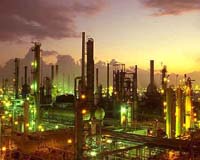 |
Baghdad (UPI) Oct 8, 2010 Iraq says it expects to raise oil production to 4 million barrels per day in 2013, up from 2.35 million now, in its drive to rival Saudi Arabia as the world's top producer. But that will depend greatly on the government's ability to protect the oil industry which will become more vulnerable as international oil giants move in to upgrade the long-neglected infrastructure and open new fields. The oil industry -- wells, refineries, pipelines and offshore export terminals -- has been a prime target for insurgent groups and tribal marauders since the March 2003 U.S.-led invasion. U.S., British and Australian forces have made a major effort to build up a special 7,000-strong Iraqi force dedicated to protecting an industry that provides 96 percent of the country's revenues and which will bankroll a major reconstruction program as it drives to boost production to as much as 12 million bpd in the next six years. With the British and Australians, key components of the U.S.-led coalition deployed in Iraq, gone and the Americans pulling out in a withdrawal scheduled to end in late 2011, the threat against Iraq's oil industry is mounting again. In September, Iraqi security officials said intelligence reports indicated the Islamic State of Iraq, a jihadist group that has wreaked havoc in Iraq, will target the oil industry in the months ahead. On Sept. 26, Iraq inaugurated the first U.S.-built Swift-class patrol boat for its small navy at its main port, Umm Qasr at the northern end of the Persian Gulf. The navy is to have 15 of these high-speed craft by the end of 2011, along with two U.S.-built offshore support vessels. Their main mission will be protect the al-Basra and Khor al-Amiya offshore loading terminals through which 80 percent of Iraq's oil exports -- around 1.7 million bpd -- are shipped south through the Persian Gulf. Rebuilding Iraq's navy has largely been the task of British and Australian forces. British navy Capt. Andrew Bolton, who formerly commanded the defense of the terminals about 65 miles off Umm Qasr, noted, "The greatest threat is ramming a boat filled with explosives against the terminals." Insurgents mounted just such an attack against the al-Amiya platform, the smaller of the terminals, in April 2004 using suicide bombers in three small craft. They got within 30 yards of the installation before Iraqi guards shot the would-be bombers and detonated the explosives. The platform was barely scratched but a two-day shutdown cost up to $28 million. While insurgents have been the primary threat, Iran, Iraq's eastern neighbor and age-old rival, is also a source of danger. Tehran has long coveted Iraq's energy wealth. In 2009, Revolutionary Guards occupied a well in the Fakkah field that lies on the disputed 800-mile border for several weeks. Iran claims the oilfield and several others on the ill-defined frontier, which it has penetrated with several military incursions in recent months to reinforce its territorial claims. Iran claims billions of dollars in reparations from Iraq for destruction caused in the 1980-88 war, which Saddam Hussein started. This has raised fears Tehran could use the claim as a pretext to seize Iraqi oilfields. Two-thirds of Iraq's proven oil reserves lie in Shiite-controlled southern Iraq and these have been fought over by rival factions in recent years. The remaining third is in the northern Kirkuk fields. But these, too, are in dispute. The minority Kurds say Kirkuk is historically their territory. Baghdad refuses to relinquish it. Tension is high. The Kurds seek eventual independence and want the oil fields that would provide an economic base for their state. This is likely to become a major flash point. Over the last seven years, insurgent groups, some of them allegedly armed and funded by Iran to cause instability, have repeatedly cut two 500-mile oil pipelines that pump Kirkuk exports to Turkey's Mediterranean terminal at Ceyhan. Tribal militias hired by Baghdad to protect the pipelines have frequently bombed the pipelines themselves to force the government to pay them more. Just guarding the highly vulnerable pipelines is a major task for the special oil protection force established by the Americans. The network stretches 5,400 miles, including 3,380 miles for oil and 1,086 miles for natural gas.
Share This Article With Planet Earth
Related Links Powering The World in the 21st Century at Energy-Daily.com
 Strike at French oil hub in its 12th day
Strike at French oil hub in its 12th day Paris (UPI) Oct 8, 2010 The roadblocks that closed the Fos-Lavera oil terminal to trucks have been taken down but strikers continued blocking sea access to France's largest oil port Friday. Dozens of tankers were waiting offshore Friday to load or unload crude as the strike at Fos-Lavera entered its 12th day. It has disrupted oil trade and refining at sites in France, Switzerland and Germany, keeping European ... read more |
|
| The content herein, unless otherwise known to be public domain, are Copyright 1995-2010 - SpaceDaily. AFP and UPI Wire Stories are copyright Agence France-Presse and United Press International. ESA Portal Reports are copyright European Space Agency. All NASA sourced material is public domain. Additional copyrights may apply in whole or part to other bona fide parties. Advertising does not imply endorsement,agreement or approval of any opinions, statements or information provided by SpaceDaily on any Web page published or hosted by SpaceDaily. Privacy Statement |